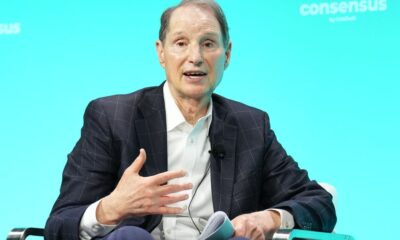Bitcoin
Telegram social games bring millions into crypto

In past lives, I was an urban planner, a crime boss, and the CEO of a thriving cryptocurrency exchange. On Telegram, of course. Why I like professional cosplay is a question for my therapist. But it’s fascinating how many Web3 games explore these real-life roles. And it’s great that the rewards are starting to be worth more bragging rights among your friends.
I spent a lot of time building my Sims’ town in the early 2000s, where I turned a small village into a bustling metropolis on my low-powered Windows95 desktop. I had to think about energy management and food supply routes and whether or not a stadium was needed to get tax revenue to support a few more parks.
Fast forward to 2009, and I’m living my best Tony Soprano life with two baseball bats, a Tommy Gun, and enough property to earn one hundred and seven thousand dollars every 54 minutes in virtual currency. What “Mob Wars” had that The Sims didn’t was the network effect power of the Facebook recommendation feed. The fact that you could see the moves your friends were making made you want to join the game, and the exponential effect just kept rolling and rolling.
Until Facebook crushed the category by repressing external notifications, taxing virtual items and prioritizing its own resources over those of third parties.
Telegram has learned some lessons from the original social media platforms and added new gamification modes that appeal to the insatiable gamer mentality of the crypto crowd. Telegram, which has 900 million monthly users, is proving that gaming can be the next big player/customer acquisition platform to help grow a blockchain-based business.
Telegram Messenger has been around for over ten years. Brothers Nikolai and Pavel Durov created the encrypted messaging platform in 2013 and soon after had one hundred thousand users on the nascent platform.
Today, that number is approaching a billion, and although it is not fully decentralized, its combination of strong encryption and distributed storage security makes it a favorite among the crypto community. And that was before Hamster Kombat arrived on the platform.
To date, there are several crypto Telegram bots: services like Meme and Gif creators, GitHub notification bots, integrations with Gmail and Spotify. One type of application that the crypto crowd has particularly embraced is gamification. In BonkBotwhich enabled simple and hyper-fast crypto exchange during the recent memecoin season Solana to Notcoin, which accumulated a $1 billion in FDV after 35 million players eliminated in the Telegram-based game from January to April. Clear lesson: utility and fun, plus encryption, work well in the messaging app. A hamster comes calling
The most recent entrant to catch fire in this scheme is Hamster Kombat. In just over four weeks, the app has grown to over 8 million players, with over 3 million playing daily.
The premise of Hamster Kombat is pretty straightforward. You are the CEO of a cryptocurrency exchange of your choice (Binance, OKX, MEXC and others). At first, just tap the hamster on the screen to start earning some points. Once the available points are exhausted, they start counting again, encouraging you to come back and tap for more.
Once you have accumulated enough, you as the CEO can start putting your coin to work. You can stake your points into BTC and ETH pairs, generating hourly returns. You can spend it on CoinTelegraph (or CoinDesk if you get to level 10) or on improving your KYC or AML security. Each pick brings back more profits per hour, so you can now earn passively and put more currency to work to grow your dummy exchange.
From a marketing perspective, the more you share with friends, the more you participate in connected channels, the more you earn to grow your business, the better. Hence the SocialFi overlay that makes the game so viral. I have seven friends, all playing through links I shared with them, which gives me more money to invest in growing my empire.
Hamster Kombat allows partners to buy “cards” and players to perform actions and earn more currency per hour. Joining a Telegram partner channel can cost 15,000 points. But it pays 3,000 points per hour, making it something that “paid for itself” in 5 hours of active involvement with the game. This partner, a new gaming blockchain, saw its Telegram subscribers increase to over 1.2 million people in just a few days after launching with Hamster Kombat, an incredibly fast onboarding of new users into an ecosystem where attention and users are in high demand. It was then that I felt the need to reach out and investigate what their special sauce is.
I contacted Nikita Anufriev, marketing consultant for Hamster Kombat and host of a popular Russian-language program crypto channel on Youtube. Anufriev confirmed that the project was launched on March 25th this year and took just 11 days to reach 1 million players. It has since surpassed 8 million players, and claimed that 2.8 million users play daily with an average usage time of 52 minutes per day. Pretty surprising for a new game tied directly to a social media platform.
When asked about the game’s genesis, Anufriev gave credit to a ten-year-old game called USA Simulator, an iOS/Android game from the mid-2010s where you play as a politician with the stated goal of “Developing your country, expanding the sphere of influence and lead the country to world domination!.” He said the founders took inspiration from the game and revamped it to be specifically about the crypto industry and allowed users to put themselves in the shoes of CZ (Binance) or Brian Armstrong (Coinbase).
“The viral effect started from 3 [shares per player] and now it is close to 15,” said Anufriev. “Game mechanics like a new card encourage you to invite friends and we’ve seen this issue in certain regions where too many influencers have started promoting it and regular people don’t have enough people to invite.” Anufriev’s team targeted an influencer audience for the first few hundred thousand users, but then the network effect took over. “Telegram is very popular among cryptocurrency users and is the number one messaging app for this audience,” he notes.
Telegram’s TON (Telegram Open Network), Telegram’s Layer-1 Blockchain, has seen serious adoption recently, and TON token has increased with it. But Anufriev said the project will issue its token on the Binance Smart Chain, with a launch date scheduled for the end of May.
Nikita Anufriev and many other Hamster players will come to Consensus 2024 and we’ll see if this reward-seeking community will also come together in real life or if they’d rather be an anonymous player behind a screen. For now, Telegram appears to be a place that anyone in crypto looking to build an audience should pay attention to.
Bitcoin
Grayscale Unveils Bitcoin Mini Trust ETF
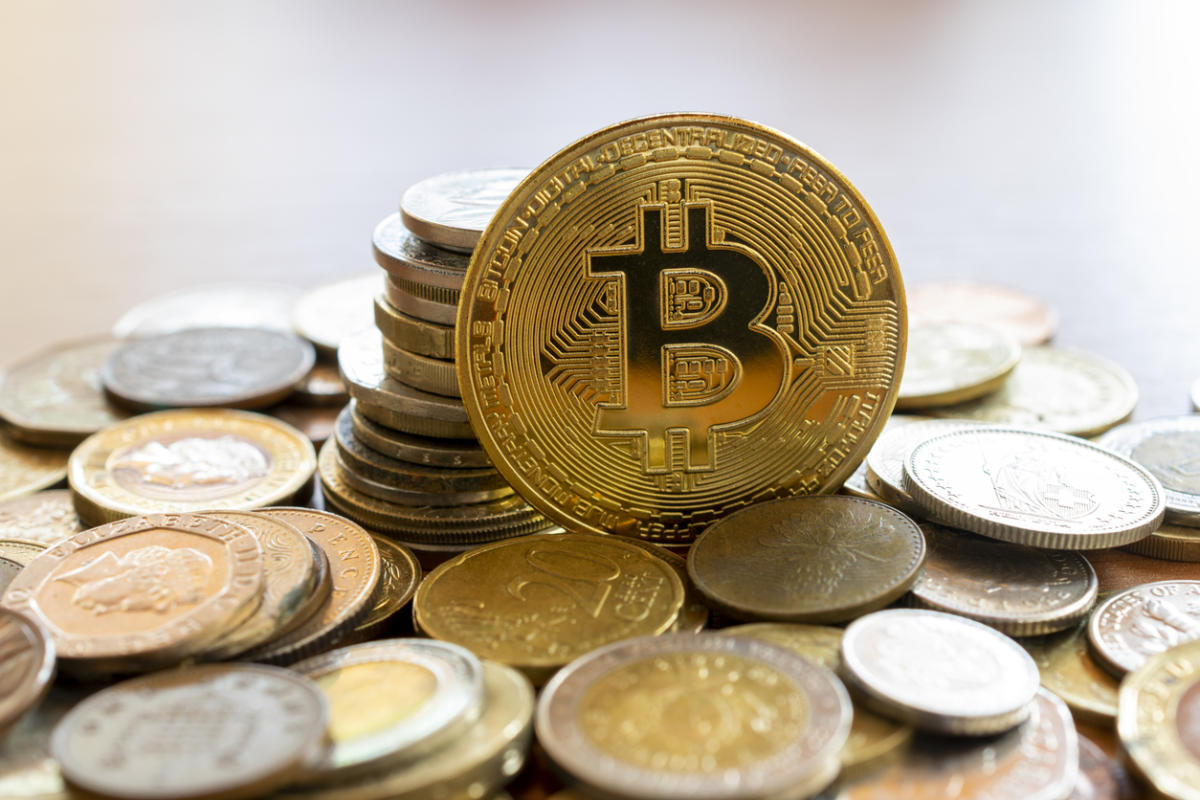
Bitcoin Currency
Grayscale Investments The Bitcoin Mini Trust began trading on Wednesday with a 0.15% expense ratio, offering a lower-cost option for bitcoin exposure in the market.
The Mini Trust, which has the symbol BTC and trades on NYSE Arca, is structured as a spin-off of the Grayscale Bitcoin Trust (GBTC). New shares will be distributed to existing GBTC shareholders with the fund contributing a portion of its bitcoin holdings to the new product. According to a company press releaseBTC’s S-1 registration statement became effective last week.
“The Grayscale team has believed in the transformative potential of Bitcoin since the initial launch of GBTC in 2013, and we are excited to launch the Grayscale Bitcoin Mini Trust to help further lower the barrier to entry for Bitcoin in an SEC-regulated investment vehicle,” said David LaValle, Senior Managing Director and Head of ETFs at Grayscale.
The Bitcoin Mini Trust’s debut comes amid growing interest in ETFs based on the current price of the two largest cryptocurrencies by market cap, bitcoin and ether. Spot bitcoin ETFs have generated nearly $18 billion in inflows since the first ones began trading on Jan. 11, though GBTC has lost nearly $19 billion in assets.
This fund differs from other funds because it is a conversion of an existing fund and has a 1.5% fee, the highest among spot bitcoin products that have received SEC approval this year.
Mini Bitcoin Trust Low Fee
On a Post X On Wednesday, Bloomberg senior ETF analyst Eric Balchunas noted the Bitcoin Mini Trust’s “lowest fee in the category…”
“[Important] to recognize how incredibly cheap 15bps is — about 10x cheaper than spot ETFs in other countries and other vehicles,” Balchunas wrote, adding that this pricing strategy reflects the competitive nature of the U.S. ETF market, which he referred to as the “ETF Terrordome.”
“This is what Terrordome does to fund [cost]. It reaches 1.5% [and] end in 0.15%, how to go from [a] country club to the jungle. But that’s why all the flows are here, investor paradise,” he noted.
Read more: Spot Bitcoin ETF Inflows Hit Daily High of Over $1 Billion
Bitcoin was recently trading at around $66,350, virtually flat since U.S. markets opened on Wednesday.


Grayscale also offers two spot Ethereum ETFs, the Grayscale Ethereum Trust (ETHE) and the Grayscale Ethereum (ETH) Mini Trustwhose performance is based on ETHE. ETHE outflows exceeded $1.8 billion in its first six days of trading, while ETH added more than $181 million in the same period, according to Farside. The remaining seven ETFs generated about $1.2 billion in inflows.
The story continues
Read more: Spot Ethereum ETFs Approved to Start Trading
Permanent link | © Copyright 2024 etf.com. All rights reserved
Bitcoin
Bitcoin (BTC) Price Drops Below $65K After FOMC as Middle East Tensions Rise
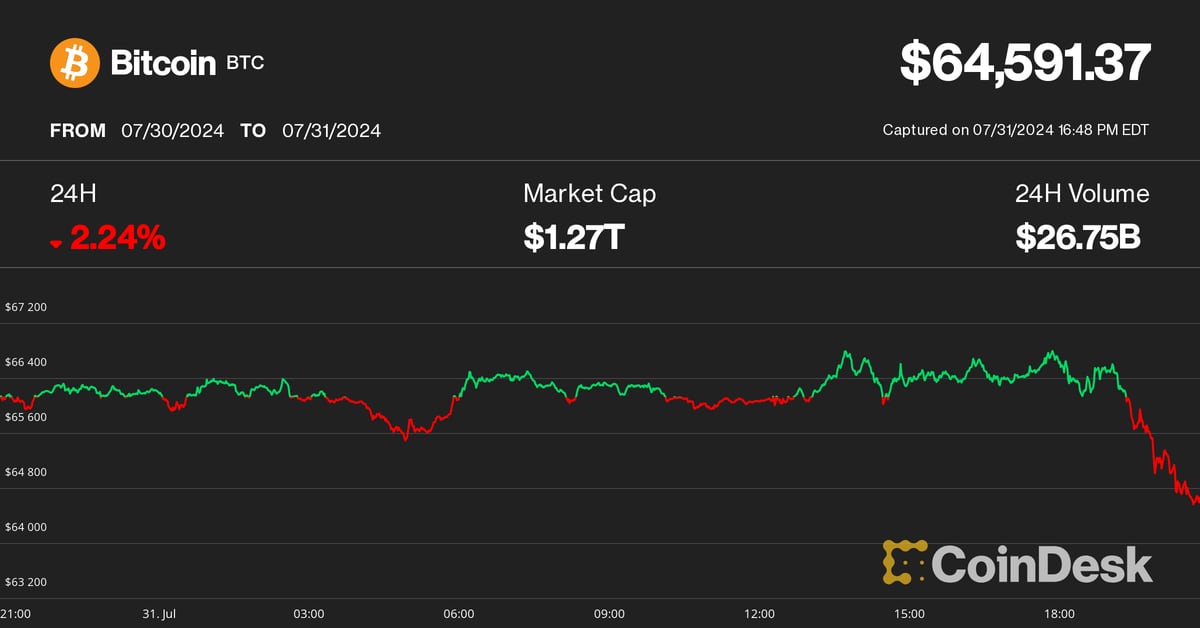
Cryptocurrencies fell sharply on Wednesday as rising geopolitical risks captivated investors’ attention following the conclusion of the Federal Reserve’s July meeting.
Bitcoin (BTC) fell to $64,500 from around $66,500, where it traded following Federal Reserve Chairman Jerome Powell’s press conference and is down more than 2% in the past 24 hours. Major altcoins including ether (ETH)sunbathing (SUN)Avalanche AVAX (AVAX) and Cardano (ADA) also fell, while Ripple’s XRP saved some of its early gains today. The broad cryptocurrency market benchmark CoinDesk 20 Index was 0.8% lower than 24 hours ago.
The liquidation happened when the New York Times reported that Iran’s leaders have ordered retaliation against Israel over the killing of Hamas leader Ismail Haniyeh in Tehran, raising the risk of a wider conflict in the region.
Earlier today, the Fed left benchmark interest rates unchanged and gave little indication that a widely expected rate cut in September is a given. The Fed’s Powell said that while no decision has been made on a September cut, the “broad sense is that we are getting closer” to cutting rates.
While digital assets suffered losses, most traditional asset classes rose higher during the day. U.S. 10-year bond yields fell 10 basis points, while gold rose 1.5% to $2,450, slightly below its record highs, and WTI crude oil prices rose 5%. Stocks also rallied during the day, with the tech-heavy Nasdaq 100 index rebounding 3% and the S&P 500 closing the session 2.2% higher, led by 12% gains in chipmaker giant Nvidia (NVDA).
The different performances across asset classes could be due to traders’ positioning ahead of the Fed meeting, Zach Pandl, head of research at Grayscale, said in an emailed note.
“Equities may have been slightly underutilized after the recent dip, while bitcoin is coming off a strong period with solid inflows, while gold has recovered after a period of weakness,” he said.
“Overall, the combination of Fed rate cuts, bipartisan focus on cryptocurrency policy issues, and the prospect of a second Trump administration that could advocate for a weaker U.S. dollar should be viewed as very positive for bitcoin,” he concluded.
UPDATE (July 31, 2024, 21:30 UTC): Adds grayscale comments.
Bitcoin
Donald Trump’s Cryptocurrency Enthusiasm Is Just Another Scam
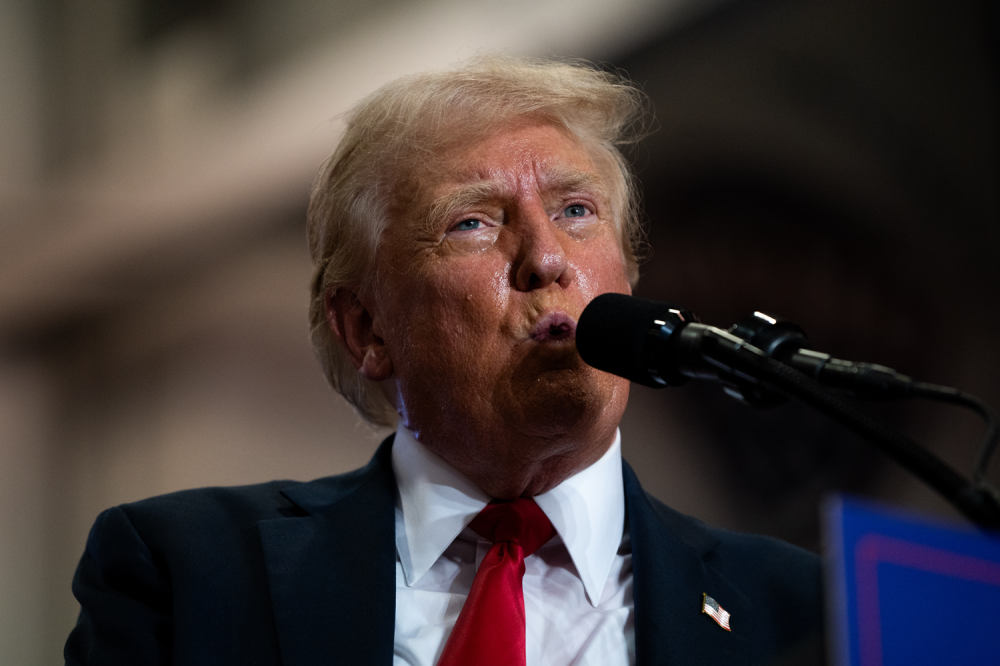
Former US President Donald Trump spoke at the Libertarian National Convention in May and lent his a strong support to crypto: “I will also stop Joe Biden’s crusade to crush crypto. … I will ensure that the future of crypto and the future of bitcoin is made in the US, not taken overseas. I will support the right to self-custody. To the 50 million crypto holders in the country, I say this: With your vote, I will keep Elizabeth Warren and her henchmen out of your bitcoin.”
Former US President Donald Trump spoke at the Libertarian National Convention in May and lent his a strong support to crypto: “I will also stop Joe Biden’s crusade to crush crypto. … I will ensure that the future of crypto and the future of bitcoin is made in the US, not taken overseas. I will support the right to self-custody. To the 50 million crypto holders in the country, I say this: With your vote, I will keep Elizabeth Warren and her henchmen out of your bitcoin.”
Trump continued to court the cryptocurrency industry in the months that followed; he he appeared at the Bitcoin 2024 Conference in Nashville this week, along with independent presidential candidate Robert F. Kennedy Jr.’s parting words to Trump — “Have fun with your bitcoin, your cryptocurrency and whatever else you’re playing with” — were less than enthusiastic, but the industry itself remains packed with ardent Trump supporters.
This turnaround came as a surprise, given Trump’s previous strong opposition to cryptocurrency. When Facebook was floating its Libra cryptocurrency in 2019, Trump tweeted: “I am not a fan of Bitcoin and other cryptocurrencies, which are not money, and whose value is highly volatile and based on thin air.” Former national security adviser John Bolton’s White House memoir, The Room Where It Happened, quotes Trump as telling Treasury Secretary Steven Mnuchin: “Don’t be a trade negotiator. Go after Bitcoin.” [for fraud].” In 2021, Trump counted Fox Business that bitcoin “just looks like a scam. … I want the dollar to be the world’s currency.”
Why the change? There doesn’t seem to be any crypto votes. Trump’s “50 million” number comes from a poorly sampled push survey by cryptocurrency exchange Coinbase which claimed 52 million cryptocurrency users in the United States starting in February 2023. But one survey A survey conducted last October by the US Federal Reserve showed that only 7% of adults (about 18.3 million people) admitted to owning or using cryptocurrencies — down from 10% in 2022 and 12% in 2021. Many of these people are likely wallet owners who were left holding the bag after crypto plunged in 2022 — and are not necessarily new fans.
What Trump wants from the cryptocurrency industry is money. The cryptocurrency industry has already raised more than US$ 180 million to run in the 2024 US elections through his super PACs Fairshake, Defend American Jobs and Protect Progress.
Fairshake spent $10 million on taking Rep. Katie Porter in the primary battle for Dianne Feinstein’s California Senate seat by funding Porter’s pro-crypto rival Adam Schiff. This put $2 million to knock out Rep. Jamaal Bowman in the Democratic primary for New York’s 16th District in favor of pro-crypto George Latimer. In the Utah Senate Republican primary, Rep. John Curtis defeated Trent Staggs with the help of $4.7 million from Defend American Jobs. In Alabama’s House District 2, the majority of campaign expenses came from the cryptocurrency industry.
Fairshake is substantially financed by Coinbase, cryptocurrency issuer Ripple Labs, and Silicon Valley venture capital firm Andreessen Horowitz, or a16z. Silicon Valley was awash in cryptocurrencies during the 2021 bubble, and a16z in particular continues to promote blockchain startups to this day — and still holds a huge amount of bubble crypto tokens that he wishes he could cash in on.
Many in Silicon Valley would like an authoritarian who they think will let them run wild with money — while bailing them out in tough times. Indeed, Trump promised Bitcoin 2024 participants that he hold all bitcoins that the United States acquires. (Never mind that it is usually acquired as the proceeds of crime.) Silicon Valley explicitly sees regulation of any kind as its greatest enemy. Three a16z manifestos — “Politics and the Future” It is “The Techno-Optimist Manifesto” and 2024 “The Small Tech Agenda—describe co-founders Marc Andreessen and Ben Horowitz’s demands for a technology-powered capitalism unhindered by regulation or social considerations. They name “experts,” “bureaucracy,” and “social responsibility” as their “enemies.” Their 2024 statement alleges that banks are unfairly cutting off startups from the banking system; these would be crypto companies funded by a16z.
Trump’s vice presidential pick, Senator J.D. Vance, is a former Silicon Valley venture capitalist. He was once employed by Peter Thiel, who bankrolled Vance’s successful 2022 Senate run; Vance has been described as a “Thiel creation”. He has increased support for the Trump ticket among his venture capital associates. Vance is a bitcoin holder and a frequent advocate of encryption. He recently released a draft bill to review how the Securities and Exchange Commission (SEC) and the Commodity Futures Trading Commission (CFTC) control crypto assets. In 2023, he circulated a bill to prevent banks from cutting out cryptocurrency exchanges.
Minimal regulation has been tried before. It led to the wild exuberance of the 1920s, which ended with the Black Tuesday crash of 1929 and the Great Depression of the 1930s. Regulators like the SEC were put in place during this era to protect investors and transform the securities market from a jungle into a well-tended garden, leading to many prosperous and stable decades that followed.
Crypto provides the opposite of a stable and functional system; it is a practical example of how a lack of regulation allows opportunists and scammers to cause large-scale disasters. The 2022 Crypto Crash repeated the 2008 financial crisis in miniature. FTX’s Sam Bankman-Fried was feted as a financial prodigy who would perform economic miracles if you just gave him carte blanche; he ended up stealing billions of dollars of customers’ money, destroying the lives of ordinary people, and is now in a prison cell.
U.S. regulators have long been concerned about the prospect of cryptocurrency contagion to the broader economy. Criminal money laundering is rampant in cryptocurrency; even the Trump administration has made rules in December 2020 to reduce the risk of money laundering from crypto. Meanwhile, the crypto industry has persistently tried to infiltrate systemically risky corners of the economy, such as pension funds.
Four U.S. banks collapsed during the 2023 banking crisis, the first since 2020. Two of them, Silvergate Bank and Signature Bank, were deeply embedded in the crypto world — Silvergate in particular appears to have collapsed directly from its heavy reliance on FTX and failed a few months after that. Silicon Valley Bank was not involved in crypto but collapsed due to a run on the bench due to panic among venture capital deposit holders, particularly Thiel’s Founders Fund.
Project 2025the Heritage Foundation mammoth conservative wish list The plan, which Trump and Vance have both endorsed and tried to distance themselves from at various times, emphasizes the importance of party loyalists, noting especially financial regulation. The plan recommends replacing as much of the federal bureaucracy as possible with loyalists and “trusted” career officials rather than nonpartisan “experts.” Vance defended in 2021 that Trump should “fire every mid-level bureaucrat, every civil servant in the administrative state” and “replace them with our people.” Loyalty will likely trump competence.
Crypto is barely mentioned directly in Project 2025 — suggesting it has little active support among the broader conservative coalition. But near the end of the manifesto is a plan to dismantle most U.S. financial regulations and investor protections put in place since the 1930s, suggesting the exemption the crypto industry seeks from current SEC and CFTC regulations.
Bitcoin, the first cryptocurrency, started as an ideological project to promote a strange variant of Murray Rothbard’s anarcho-capitalism and the Austrian gold-backed economy—the kind we abandoned to escape the Great Depression. Crypto quickly co-opted the “end of the Fed” and “establishment elites” conspiracy theories of the John Birch Society and Eustace Mullins. It’s a way for billionaire capitalists like Thiel, Andreessen and Elon Musk to claim they’re not part of the so-called elite.
If a second Trump administration were to limp along with financial regulators and allow cryptocurrencies to have free rein, it could help foster the collapse of the U.S. economy that bitcoin claimed to prevent. But Trump is more likely to be happy to take the crypto money and run.
Bitcoin
Trump’s Bitcoin (BTC) Reserve Plan Seen as Just a ‘Small Token Stash’
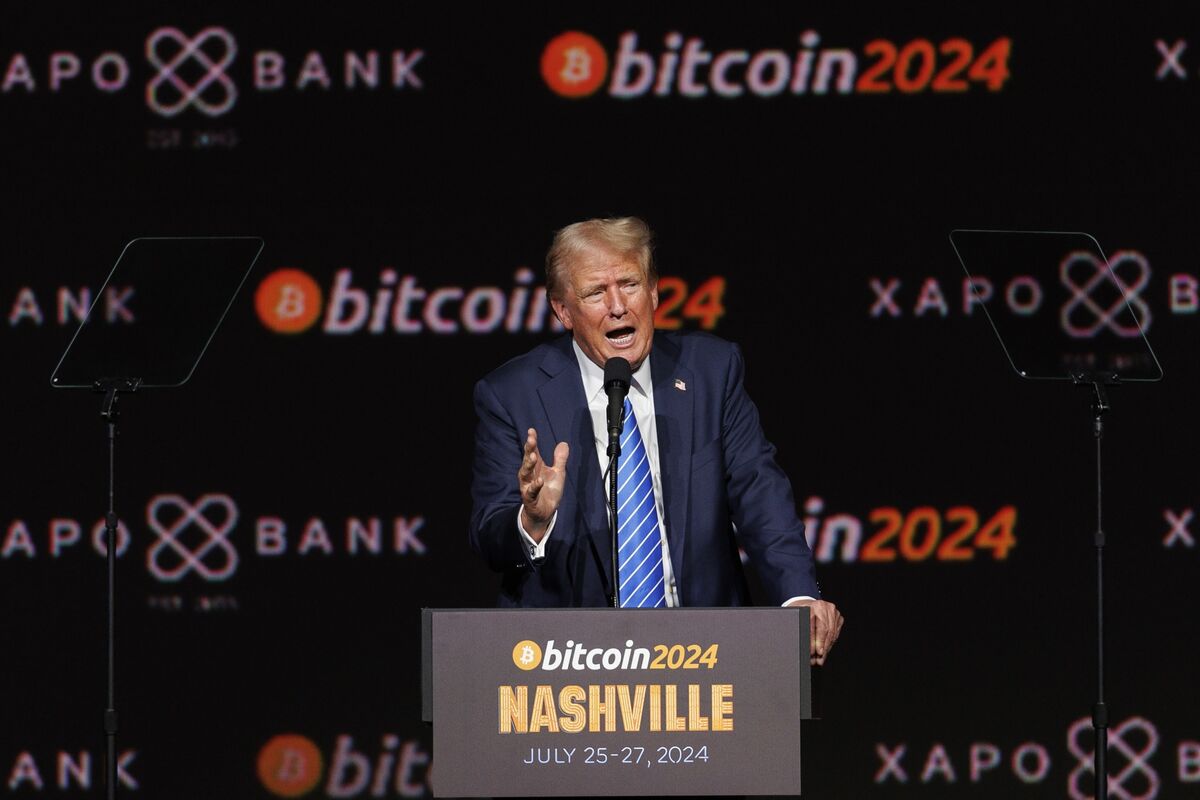
Donald Trump’s recent promise to create a “strategic national stockpile of Bitcoin” may not turn out to be as big a commitment as the hype surrounding the announcement makes it seem.
“Trump’s proposal is extremely modest,” said George Selgin, director emeritus of the Center for Monetary and Financial Alternatives at the Cato Institutea Washington-based public policy group. “It doesn’t have much economic implication.”
-

 Ethereum11 months ago
Ethereum11 months agoEthereum Posts First Consecutive Monthly Losses Since August 2023 on New ETFs
-

 Regulation11 months ago
Regulation11 months agoCryptocurrency Regulation in Slovenia 2024
-

 News11 months ago
News11 months agoNew bill pushes Department of Veterans Affairs to examine how blockchain can improve its work
-

 Regulation11 months ago
Regulation11 months agoThink You Own Your Crypto? New UK Law Would Ensure It – DL News
-

 Regulation11 months ago
Regulation11 months agoA Blank Slate for Cryptocurrencies: Kamala Harris’ Regulatory Opportunity
-

 Regulation11 months ago
Regulation11 months agoUpbit, Coinone, Bithumb Face New Fees Under South Korea’s Cryptocurrency Law
-

 Regulation11 months ago
Regulation11 months agoBahamas Passes Cryptocurrency Bill Designed to Prevent FTX, Terra Disasters
-

 Regulation11 months ago
Regulation11 months agoIndia to Follow G20 Policy for Cryptocurrency Regulation: MoS Finance
-

 Ethereum1 year ago
Ethereum1 year agoComment deux frères auraient dérobé 25 millions de dollars lors d’un braquage d’Ethereum de 12 secondes • The Register
-

 Videos1 year ago
Videos1 year agoNexus Chain – Ethereum L2 with the GREATEST Potential?
-

 News11 months ago
News11 months agoEU supports 15 startups to fight online disinformation with blockchain
-

 News1 year ago
News1 year agoSolana ranks the fastest blockchain in the world, surpassing Ethereum, Polygon ⋆ ZyCrypto



